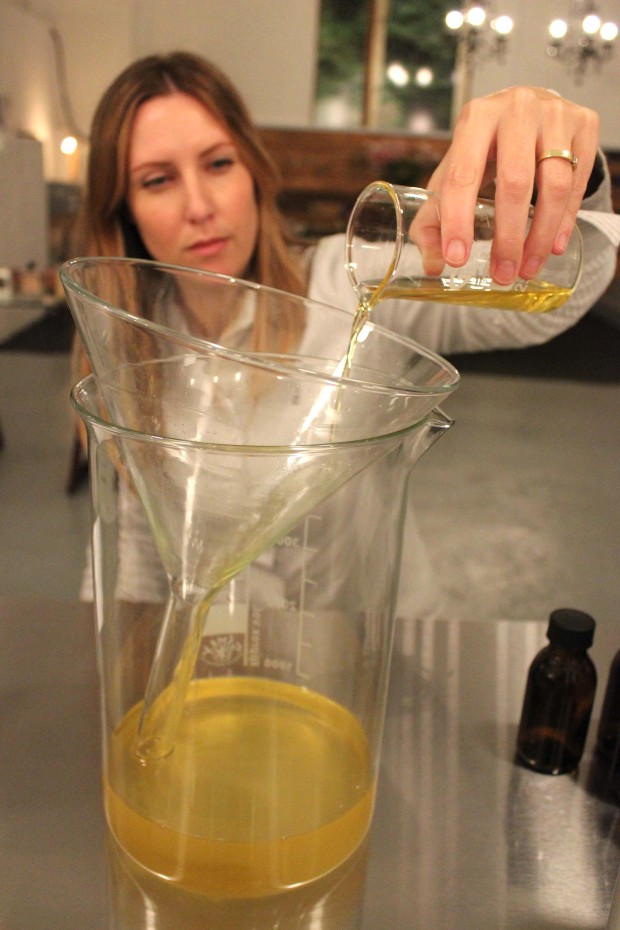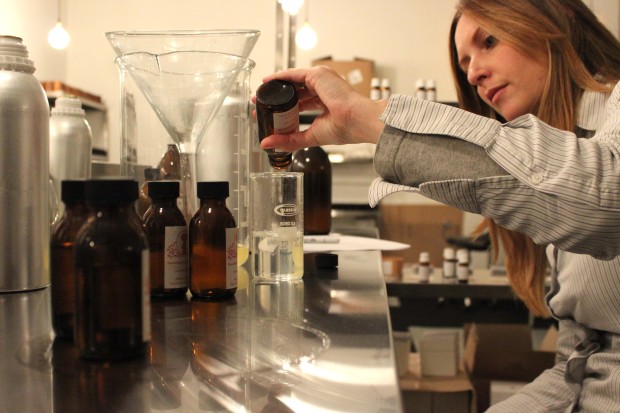Careers in Science: Perfumer

How to Become a Perfumer: Career Path Guide
If you want to become a perfumer or a cosmetic scientist, you first need to determine if this career path is a good fit for you. If the following description sounds like you, then you’re probably well suited for a career as a perfumer:
Those who become perfumers must have a ‘good nose’, a natural aptitude in science and an education in chemistry or cosmetic science. In addition to the scientific knowledge, which is needed to create new products, perfumers must have an insight into the nature of consumers and how the cosmetics industry works.
To become a perfumer, you need both patient and persistent, as the work of a perfumer is largely based in trial and error; it can often take up to 500 trials to find the perfect note for a fragrance. A career as a perfumer is not for those who expect immediate gratification from work activities; rather it is for those that savour victory after enduring a long battle.
Those who become perfumers must be comfortable working in a laboratory setting, and communicating their findings and opinions to others. They must also have the manual dexterity necessary to use specialized laboratory equipment.
Below we’ve outlined what you’ll need to begin a career as a perfumer. We’ve also included helpful information for this career, such as job description, job duties, salary expectations, a list of possible employers and much more!
Perfumer Job Description
Perfumers, also known as Cosmetic Scientists, are responsible for conducting chemical testing in order to assist in the qualitative and quantitative analysis of materials used to develop new cosmetic products, such as shampoos, soaps, creams, other toiletries and perfumes. Perfumers are also responsible for developing or improving production processes in order to ensure they are efficient and conform to environmental and quality control standards and regulations.
Perfumer Job Duties
• Evaluate odours of aromatic chemicals
• Set production standards and ensure workers are adhering to them
• Review batch sheets prepared for distillation department in order to ensure that they comply with formulas devised in the laboratory
• Determine quality of prepared materials by visiting compounding and distillation areas
• Smell all my trials from the previous days
• Assign priority levels based on the type of project and the given deadlines
• Adjust formulas of samples needing improvement
• Meet with product evaluators; discuss which samples are ready and which need more work
• Approve batches for finishing
• Reject batches that do not meet criteria
• Evaluate fragrances for specific characteristics, such as odor, body, harmony, strength, and permanence
Education Needed to Become a Perfumer
To become a perfumer, you typically need a degree in cosmetic science or chemistry and a lot of additional specialized training. Another option is to attend a specialized perfumer course (such as those offered by large fragrance houses), and pursue further specialized training.
A bachelor’s degree in cosmetic science is the best preparation for this career. It prepares you to work in the research and development laboratories of the cosmetic and toiletry industry by providing you with essential scientific knowledge, and skills that are essential for your future career as a perfumer. These skills include laboratory skills, time management and teamworking skills, as well as good written and oral communication skills.
A master’s or doctoral degree in cosmetic science can be very helpful for a career as a perfumer, as it will help you further refine your laboratory skills, and give you experience conducting original research.
Perfumer Salary Level
The salary level of perfumers can vary depending on factors such as their level of education, their level of experience, where they work, their reputation in the field, the specific responsibilities of their job, and many others.
Skills and Traits for Becoming a Perfumer
In order to become effective in a career as a perfumer, you need to posses certain skills and personality traits. These skills and traits will allow you to perform your job with competence, and they will also help you endure the ups and downs of this career.
• A ‘good nose’
• Healthy knowledge of chemistry and cosmetic science
• Patience and persistence
• Able to work through trial and error
• Able to endure more failure than success with regards to work objectives
• Ability to complete work within established deadlines
• Excellent laboratory skills
• An inquiring mind
• Ability to work on a team
• Able to work independently for long periods of time
• Able to closely follow protocol without cutting corners
Getting Perfumer Work Experience as a Student
Most universities that offer cosmetic science courses have strong connections to the cosmetic and perfume industries, and include a practicum placement as part of the curriculum. These placements may be hosted by various departments within an organization, such as research and development, marketing or technical sales.
These placements will help reinforce your scientific knowledge of how to create new products, and give you an insight into the nature of consumers and how the cosmetics industry works. They will also help you get your foot in the door with an employer upon graduation.
Who Hires Perfumers?
Perfumers are typically hired on a permanent or contractual basis as laboratory employees or contractors for organizations that develop fragrances for consumer products. They may also work in other departments within these organizations, such as Sales & Marketing or Administration. Perfumers may also have jobs in government and academia.
Organisations that hire Perfumers include:
• Large and small fragrance houses
• Final product manufacturers of cosmetic products such as shampoos, soaps, creams and other products
• Contract manufacturers
• Raw materials suppliers
• Cosmetic science consulting companies
• Government agencies
• Colleges and universities





